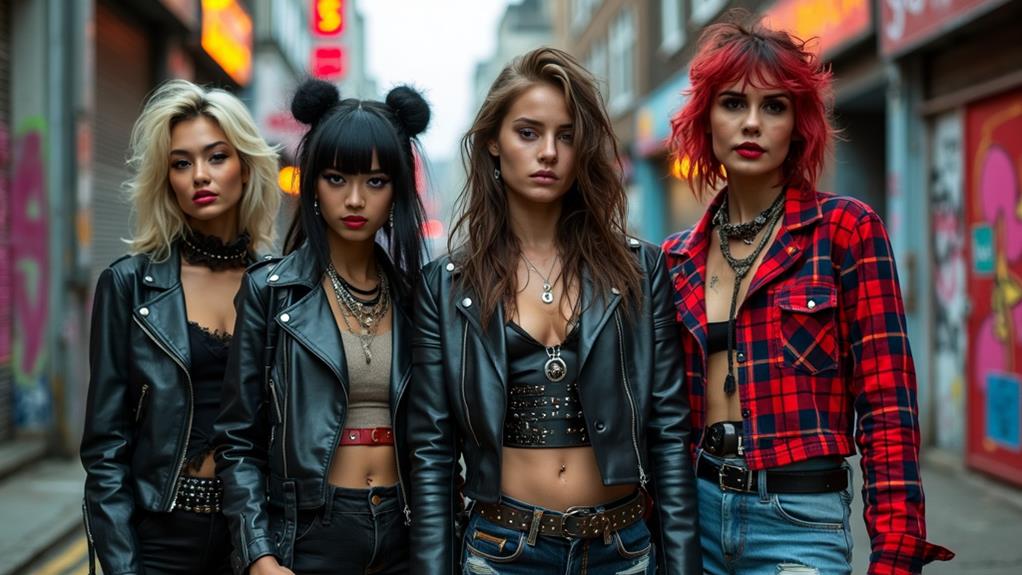When reflecting on the 80s, it’s hard not to envision leather jackets, high-waisted jeans, and neon everything. This era was a stage for bold silhouettes and vibrant patterns, showcasing a lively spirit that remains unforgettable. From punk-inspired ripped denim to the rise of athleisure with tracksuits and biker shorts, the trends were as eclectic as they were iconic. However, what truly distinguished 80s fashion were the statement accessories, such as oversized earrings and chunky necklaces. So, what made this decade’s fashion so memorable? Let’s delve into the details that defined this unique period.
Leather Fashion
Step into the bold world of 80s leather fashion, where edgy styles reigned supreme. The leather jacket became a fundamental piece, embodying the rebellious spirit of the punk scene. These jackets were often adorned with studs and chains, making a striking statement. The punk scene wasn’t just about the music; it was a lifestyle, with leather at its core.
Asymmetrical styles took center stage, particularly in leather dresses popularized by icons like Amanda Lear. Paired with futuristic sunglasses and fishnet tights, these pieces showcased a bold and edgy aesthetic. The asymmetry added a touch of avant-garde flair, pushing the boundaries of conventional fashion.
Rick Owens, a key designer, brought modern reinterpretations to traditional leather garments. His avant-garde approach blended seamlessly with the classic leather jacket, making it a staple in contemporary wardrobes. The double-breasted leather blazer, like the FRAME 70s Leather Blazer, became a crucial piece, often spotted on supermodels with metallic trousers.
Leather fashion in the 80s wasn’t just about clothing; it was an attitude. Embrace the boldness, rebellion, and undeniable cool of this unforgettable era.
Cowboy and Western Styles
Transitioning from the rebellious leather trends, the 80s saw a surge in cowboy and Western styles, adding a rugged yet chic flair to the decade’s fashion landscape. Cowboy boots became a fashion staple, often paired with flowy dresses at iconic venues like Studio 54. This trend wasn’t fleeting; designers like Ganni still offer retro-inspired variations today, highlighting its enduring appeal.
Western styles extended beyond footwear. The luxe country club aesthetic gained immense popularity, thanks to 80s icons like Jerry Hall and Marie Helvin. Tailored pieces, such as Balmain’s cropped velvet blazers, introduced a high-end twist to the Western look, making it a versatile investment for modern wardrobes.
Cowboy hats also became significant fashion accessories, symbolizing a rebellious spirit and a connection to American heritage. The blend of classic cowboy elements with contemporary styles allowed Western-inspired fashion to resurge in mainstream culture.
These Western styles often intertwined with other 80s fashion trends, showcasing the period’s eclectic nature. Embracing cowboy and Western styles lets you channel a rugged yet sophisticated vibe that remains timeless.
Punk and Grunge Influences
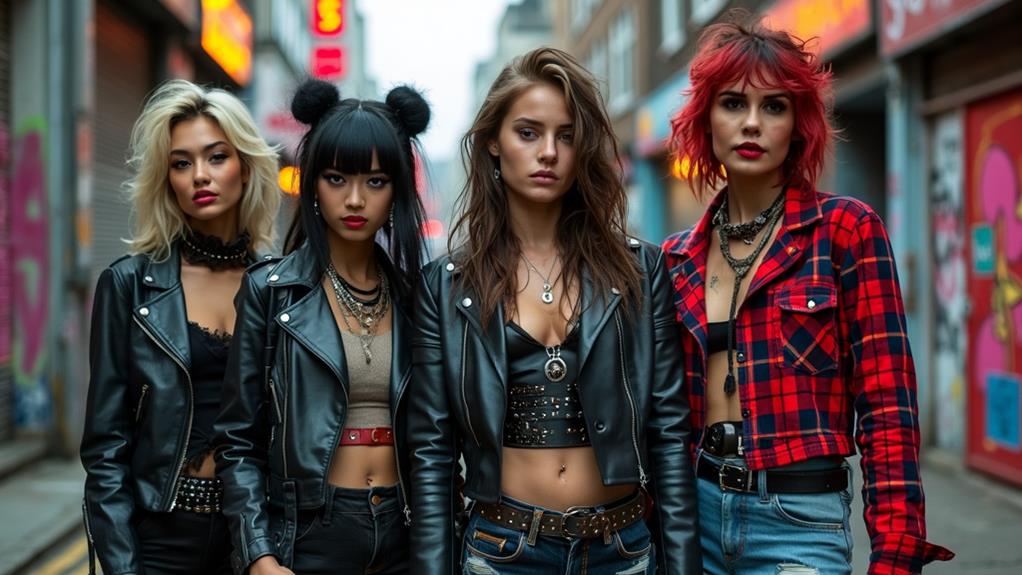
The 80s punk rock scene, with its rebellious spirit and DIY ethos, left an indelible mark on fashion. Iconic looks like ripped jeans, leather jackets, and DIY modifications exemplified individuality. Accessories such as chains, studs, and fishnet stockings embodied the movement’s anti-establishment ethos.
As the decade progressed, grunge emerged, infusing a laid-back, careless vibe into fashion. Acid wash denim, oversized flannel shirts, and combat boots became essential items, epitomizing an effortlessly cool, anti-fashion attitude. Grunge prioritized comfort and rebellion, resonating deeply with youth subcultures tired of polished, mainstream styles.
Iconic bands like The Sex Pistols and The Clash, along with unique personalities such as Cyndi Lauper, propelled these subcultures into mainstream awareness, ensuring their lasting impact. Punk and grunge didn’t just shape fashion—they challenged traditional beauty standards and gender norms. This eclectic approach to personal style continues to influence contemporary fashion, making the 80s a decade of unforgettable sartorial rebellion.
Bold Silhouettes
The bold silhouettes of the 1980s revolutionized fashion with their dramatic shapes and commanding presence. Shoulder pads became a hallmark of the era, with designers like Thierry Mugler pushing boundaries. Power suits with exaggerated shoulders were often donned by influential figures such as Margaret Thatcher, symbolizing women’s growing influence in the workforce.
High-waisted jeans also played a crucial role in defining the decade’s iconic silhouette. These jeans offered a flattering fit and were typically paired with cropped tops to accentuate the waist. The high rise added to the dramatic effect, making them a staple in 80s fashion.
Voluminous dresses and skirts, often made from fabrics like taffeta, were popular for evening wear. These pieces showcased dramatic shapes and added an extravagant touch to the period’s fashion. The bold silhouettes were further enhanced by vibrant colors, creating a fashion landscape that celebrated self-expression and individuality.
| Fashion Element | Description |
|---|---|
| Shoulder Pads | Exaggerated shoulders in blazers and suits |
| High-Waisted Jeans | Flattering fit, often paired with cropped tops |
| Voluminous Dresses/Skirts | Made from taffeta, ideal for evening wear |
The fashion of the 1980s was all about making a statement, and its bold silhouettes achieved just that.
Vibrant Colors and Patterns
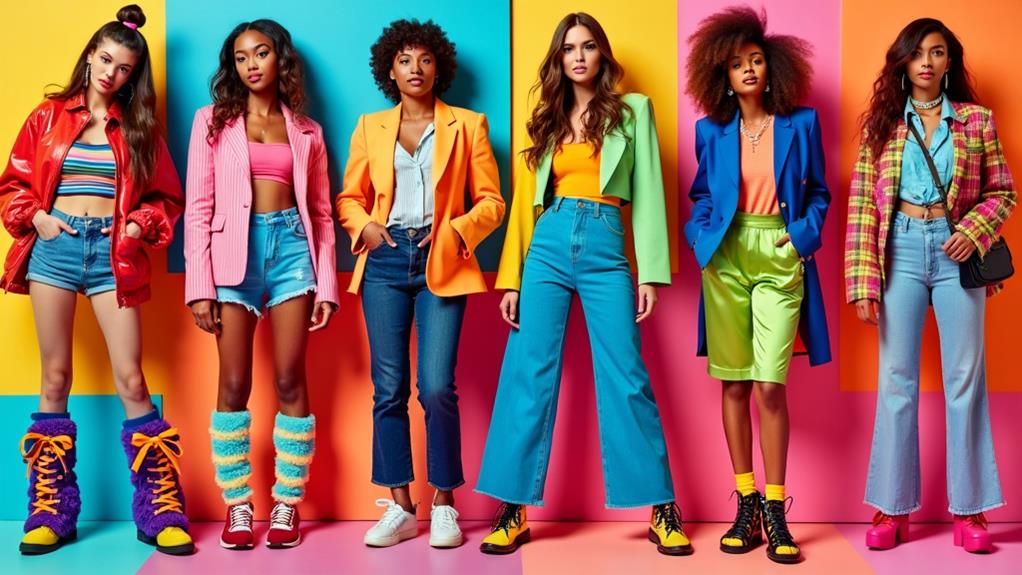
You can’t discuss 80s fashion without highlighting the neon explosion that defined the era. Bold prints like animal and geometric patterns dominated, allowing individuals to express their creativity. The rise of rave culture and color-blocking solidified these vibrant colors and striking patterns as iconic symbols of the period’s fearless style.
Neon Fashion Explosion
Neon fashion dominated the 1980s, characterized by its vibrant, fluorescent colors that mirrored the decade’s dynamic and energetic atmosphere. These bold hues became emblematic of 80s fashion trends, encapsulating the era’s adventurous and fun-loving spirit. Neon wasn’t just about standing out; it signified a cultural shift towards more daring and expressive styles. The trend permeated various aspects of life, from nightlife to athletic wear, symbolizing the rise of rave culture and high-energy dance scenes.
Neon leggings, oversized tops, and striking accessories were ubiquitous, creating memorable and unique combinations that emphasized individuality. Influential pop culture figures and music icons of the time embraced neon fashion, cementing its place in fashion history.
Today, neon fashion is experiencing a resurgence, with contemporary designers taking inspiration from these iconic 80s styles. The neon fashion explosion of the 1980s has proven to be more than a fleeting trend; it has left a lasting impact on how we express ourselves through clothing. So, if you’re looking to make a bold statement, consider adding a touch of neon to your wardrobe.
Bold Print Revolution
Embracing bold prints became a hallmark of 80s fashion, with vibrant colors and daring patterns flooding wardrobes everywhere. The decade was all about making a statement, and nothing did that better than radiant neon hues and eye-catching designs. Fashion in the 80s served as a canvas for self-expression, allowing individuals to showcase their unique personalities through clothing choices.
Bold prints were ubiquitous, from animal prints to geometric patterns, and they emphasized individuality and creativity. Here are four iconic elements that defined the Bold Print Revolution:
- Neon Colors: Bright fluorescent shades dominated fashion, particularly in nightlife and athletic wear, embodying the energetic atmosphere of the decade.
- Animal Prints: Leopard, zebra, and snake prints were wildly popular, adding a fierce and adventurous edge to outfits.
- Geometric Patterns: Sharp, angular designs brought an edgy, modern feel, often seen in dresses and accessories.
- Polka Dots: Making a significant comeback, polka dots were frequently paired with bold colors, enhancing the playful spirit of the period.
The combination of these vivid colors and eclectic patterns allowed for unprecedented self-expression, making 80s fashion a memorable explosion of creativity and style.
Casual and Athleisure Trends
Discussing 80s casual and athleisure trends necessitates mentioning biker shorts and tracksuits. Biker shorts, now often paired with oversized blazers, were a fashion staple of the era and have stylishly resurfaced. Tracksuits, characterized by bright colors and bold logos, transitioned from sportswear to streetwear, heavily influenced by athletes and hip-hop culture.
Biker Shorts Resurgence
Revitalized by the athleisure movement, biker shorts have made a dynamic comeback in modern fashion, blending 80s nostalgia with contemporary style. Initially popularized for cycling and fitness, these versatile pieces have transcended their athletic origins to become staples in casual and streetwear. Today, they are often styled with oversized blazers or crop tops for a chic, modern twist.
Celebrities like Kim Kardashian and Gigi Hadid have played pivotal roles in reintroducing biker shorts to the mainstream. Their influence has made it easier for everyone to embrace this comfortable yet stylish trend. Social media platforms like Instagram and TikTok are flooded with creative styling ideas, showcasing the trend’s widespread impact.
To help you visualize the trend, here are four popular ways biker shorts are worn today:
- Paired with an oversized blazer – Achieve a sophisticated yet relaxed look.
- Matched with a crop top – Perfect for a casual, sporty vibe.
- Layered under a sheer dress – Adds a touch of edginess.
- Worn with an oversized hoodie – Ideal for a cozy, laid-back outfit.
Biker shorts are adaptable and suitable for various occasions, from casual outings to workout sessions, seamlessly blending functionality with fashion.
Tracksuits Street Style
In the vibrant 80s, tracksuits became a defining element of street style, heavily influenced by athletes and the burgeoning hip-hop culture. Bright colors and bold logos characterized these iconic outfits. Made primarily from nylon, tracksuits epitomized the decade’s casual, laid-back aesthetic, seamlessly blending sportswear with everyday wear.
The rise of aerobics and fitness culture, propelled by workout videos and celebrities like Jane Fonda, further solidified the tracksuit’s place in casual fashion. Coordinated sets were a staple, often paired with chunky sneakers and bold accessories, reflecting the 80s penchant for comfort and statement pieces.
| Aspect | Details |
|---|---|
| Material | Nylon |
| Influence | Athletes, Hip-hop culture |
| Fashion Characteristic | Bright colors, bold logos |
| Cultural Impact | Aerobics, fitness culture |
| Modern Reinterpretation | Contemporary designers revisiting the trend |
Tracksuits have retained their appeal, making a significant resurgence in modern fashion. Designers today often reimagine this 80s trend, underscoring its enduring influence. So, next time you sport a tracksuit, remember you’re not just embracing comfort but also a rich legacy of street style and athletic inspiration.
Dresses and Skirts
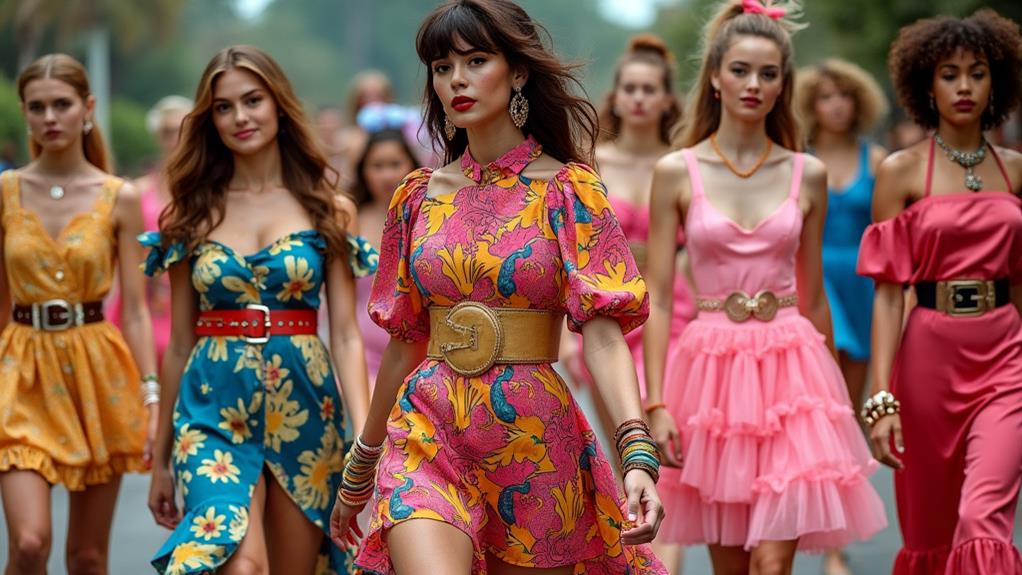
In the vibrant world of 80s fashion, dresses and skirts stood out as key elements of self-expression and style. Lace dresses, championed by style icons like Bianca Jagger, epitomized elegance and femininity with their intricate details and vintage-inspired designs, reflecting the era’s romanticism.
Mini skirts marked a dramatic shift, with hemlines rising significantly. Often paired with leggings or tights, these skirts created a bold, edgy look quickly adopted by celebrities and fashion models, embodying the daring spirit of the 80s.
Asymmetric cuts were also prominent, inspired by figures like Amanda Lear. These dresses featured creative silhouettes and were often paired with futuristic accessories, showcasing the decade’s love for experimentation and non-conformity.
Bold prints, ranging from animal patterns to geometric designs, were ubiquitous. These lively prints emphasized individuality and creativity, making each outfit a statement piece. Whether it was a zebra-striped dress or a brightly colored geometric skirt, bold prints became a staple of 80s fashion.
To summarize 80s dresses and skirts:
- Lace dresses for elegance.
- Mini skirts paired with tights for a bold look.
- Asymmetric cuts for creativity.
- Bold prints for individuality.
Statement Accessories
Anyone looking to capture the essence of 80s fashion can’t overlook the period’s statement accessories. These eye-catching pieces were essential for completing any outfit and making a strong fashion statement. Oversized earrings, often featuring bold and eclectic designs, became a must-have. Designers like Christian Lacroix and Yves Saint Laurent led the charge with their iconic accessories, defining the decade’s daring aesthetic.
Bold hats also played a significant role. Whether it was a wide-brimmed hat or a quirky beret, these items added an unmistakable touch of flair. Chunky necklaces layered over simple tops or dresses created unforgettable looks, showcasing the wearer’s confidence and style.
Skinny wrap belts, popularized by Princess Diana, cinched blouses and skirts to create a polished silhouette. These belts, often in bright colors or metallic finishes, added a sophisticated touch to various outfits. Gloves, another important accessory, were often layered with jewelry and worn by celebrities like Daryl Hannah, symbolizing both elegance and boldness.
Denim Trends
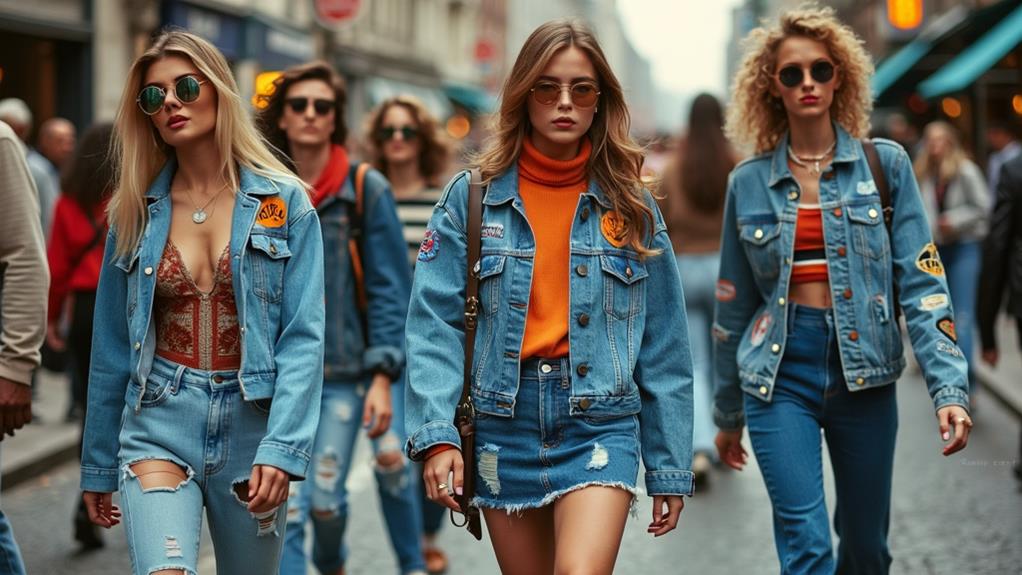
Beyond the era’s statement accessories, another iconic element of 80s fashion was the bold and varied use of denim. Whether channeling rock-n-roll vibes or embracing casual chic, denim was at the heart of it all.
High-waisted jeans were a cornerstone of 80s style. Their flattering fit and unique aesthetic, often seen in acid wash styles, made them a favorite. These jeans not only defined your waist but also provided an edgy look, seamlessly integrating into today’s trends.
Denim jackets were another must-have. Perfect for layering, they added a rebellious touch to any outfit. Often paired with high-waisted jeans, this look epitomized the double denim trend that brands like Calvin Klein popularized.
Mom jeans, with their comfortable fit and high waist, became synonymous with 80s fashion. They offered a relaxed yet stylish alternative to the more rigid styles of the time.
Ripped jeans, originating from the punk scene, symbolized rebellion and youth culture. They became a staple, embodying the spirit of the age and have remained popular ever since.
Here’s a snapshot of 80s denim trends:
- High-waisted jeans
- Denim jackets
- Mom jeans
- Ripped jeans
These trends have left an indelible mark on fashion history.
